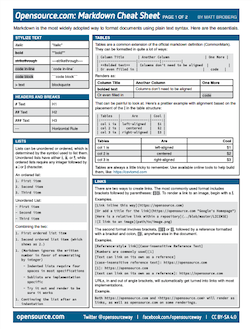Python-Markdown provides two public functions (markdown.markdown and markdown.markdownFromFile) both of which wrap the public class markdown.Markdown.If you’re processing one document at a time, these functions will serve your needs. In case you’re interested, we also have complete cheat sheets for Bootstrap, HTML, CSS, MySQL, and JavaScript. So download a copy of our Python cheat sheet and get that first.py program up and running! PDF Version of Python Cheat Sheet. Python Cheat Sheet (Download PDF) Infographic Version of Python Cheat Sheet (PNG) Python Cheat Sheet.
- Markdown Cheatsheet
- Markdown Math Cheat Sheet
- Python Jupyter Markdown Cheat Sheet
- Markdown Quick Reference
- Python Markdown Cheat Sheet
Markdown Cheat Sheet
Credit: Part of this cheatsheet is the original work of: revolunet (ongithub), with additions/modifications I gathered from other sources (cse).
If you use the fabulous Sublime Text 2/3 editor along with the Markdown Preview plugin, open your ST2 Palette with CMD+⇧+P then choose Markdown Preview in browser to see the result in your browser.
Text basics
this is *italic* and this is **bold** . another _italic_ and another __bold__ |
| this is italic and this is bold . another italic and another bold |
| Important Text: Surround with Grave symbol (backtick): ` some text ` |
this is important text. and percentage signs : % and % |
FOOTNOTES
This is a paragraph with a footnote (builtin parser only). [^footnote-1] This is another footnote[^footnote-2]. Footnotes, they should be on the news[^cnn], but not the weather^weather.
[^footnote-1]: This is the text of the first footnote.
[^footnote-2]: This is the text of the second footnote.
[^cnn]: CNN – Cable News Network
Insert [ TOC ] without spaces to generate a table of contents (builtin parsers only).
Superscript & Subscript
Surround with or
Example
This is a phrase with superscriptcool and with subscriptsick
Indentation
Here is some indented text
even more indented
Titles
Middle title (h2)
Smaller title (h3)
and so on (hX)
and so on (hX)
and so on (hX)
Example lists (1)
- bullets can be
-,+, or* - bullet list 1
bullet list 2
- sub item 1
sub item 2
with indented text inside
bullet list 3
- bullet list 4
- bullet list 5
Links
This is an example inline link (google) and another one with a title.
Links can also be reference based : reference 1 (google.com) or reference 2 with title (google.com).
References are usually placed at the bottom of the document like this:
Images
A sample image (quantumeon):
Local relative path
As links, images can also use references instead of inline links :
Embed base64 images within the markdown!
Ensure the base 64 image is all on a single line — no spaces!
Embed Format
Example
Better for the readability of your markdown file to include/embed base64 images as references
Redragon M901 PERDITION 16400 DPI High-Precision Programmable Laser Gaming Mouse for PC, MMO, 18 Programmable Buttons, Weight Tuning Cartridge, 12 Side Buttons, 5 programmable user profiles, Omron Micro Switches (Black)
Code
It's quite easy to show code in markdown files.
Backticks can be used to highlight some words.
Also, any indented block is considered a code block. If enable_highlight is true, syntax highlighting will be included (for the builtin parser – the github parser does this automatically).
Markdown Cheatsheet
Method 1
Method 2: Doesn't show up in the converted source code
Math
When enable_mathjax is true, inline math can be included (frac{pi}{2}) $pi$
Markdown Math Cheat Sheet
Alternatively, math can be written on its own line:
$$F(omega) = frac{1}{sqrt{2pi}} int_{-infty}^{infty} f(t) , e^{ – i omega t}dt$$
[int_0^1 f(t) mathrm{d}t]
[sum_j gamma_j^2/d_j]
GitHub Flavored Markdown
If you use the Github parser, you can use some of Github Flavored Markdown syntax :
User/Project@SHA: revolunet/sublimetext-markdown-preview@7da61badeda468b5019869d11000307e07e07401
User/Project#Issue: revolunet/sublimetext-markdown-preview#1
User : @revolunet
Some Python code :
Some Javascript code :
The Github Markdown also brings some nice Emoji support : :+1: :heart: :beer:
Parsers and Extensions

Markdown Preview comes with Python-Markdown preloaded.
Python-Markdown
The Python-Markdown Parser provides support for several extensions.
Extra Extensions

Python Jupyter Markdown Cheat Sheet
abbr— Abbreviationsattr_list— Attribute Listsdef_list— Definition Listsfenced_code— Fenced Code Blocksfootnotes— Footnotestables— Tablessmart_strong— Smart Strong
You can enable them all at once using the extra keyword.
If you want all the extras plus the toc extension,
your settings would look like this:
Other Extensions
There are also some extensions that are not included in Markdown Extra
but come in the standard Python-Markdown library.
code-hilite— CodeHilitehtml-tidy— HTML Tidyheader-id— HeaderIdmeta_data— Meta-Datanl2br— New Line to Breakrss— RSSsane_lists— Sane Listssmarty— Smartytoc— Table of Contentswikilinks— WikiLinks
3rd Party Extensions
Python-Markdown is designed to be extended.
Some included ones are:
delete— github style delte support via~~word~~githubemoji— github emoji supporttasklist— github style tasklistsmagiclink— github style auto link conversion of http|ftp linksheaderanchor— github style header anchor linksgithub— Adds the above extensions in one shotb64— convert and embed local images to base64. Setup by adding thisb64(base_path=${BASE_PATH})
There are also a number of others available:
Just fork this repo and add your extensions inside the ../Packages/Markdown Preview/markdown/extensions/ folder.
Check out the list of 3rd Party extensions.
Default Extensions
The default extensions are:
footnotes— Footnotestoc— Table of Contentsfenced_code— Fenced Code Blockstables— Tables
Use the default keyword, to select them all.
If you want all the defaults plus the definition_lists extension,
your settings would look like this:
Examples
Tables
The tables extension of the Python-Markdown parser is activated by default,
but is currently not available in Markdown2.
The syntax was adopted from the php markdown project,
and is also used in github flavoured markdown.
Yields:
| Year | Temp °C (low) | Temp °C (high) |
|---|---|---|
| 1900 | -10 | 25 |
| 1910 | -15 | 30 |
| 1920 | -10 | 32 |
Alignment shown below: Right, Center, Center
| Directional | Focus Win + | Move Win + Shift + |
|---|---|---|
| Left | J | J |
| Up | K | K |
| Down | L | L |
| Right | ; | ; |
Wiki Tables
If you are using Markdown2 with the wiki-tables extra activated you should see a table below:
Markdown Quick Reference
|| Year || Temperature (low) || Temperature (high) ||
|| 1900 || -10 || 25 ||
|| 1910 || -15 || 30 ||
|| 1920 || -10 || 32 ||
Python Markdown Cheat Sheet
Definition Lists
This example requires Python Markdown's def_list extension.
Apple
: Pomaceous fruit of plants of the genus Malus in
the family Rosaceae.
Orange
Update chrome on a mac. : The fruit of an evergreen tree of the genus Citrus.
